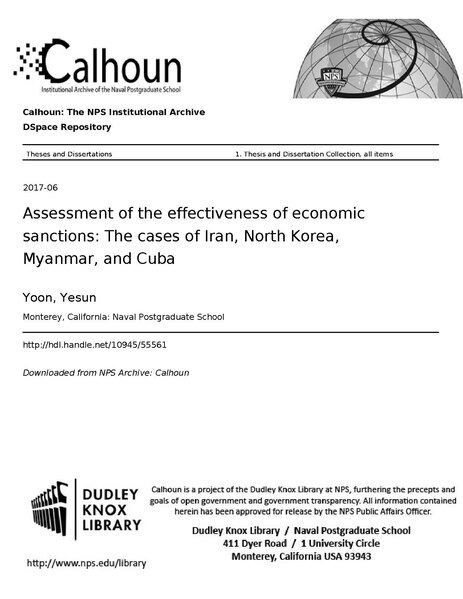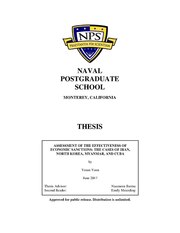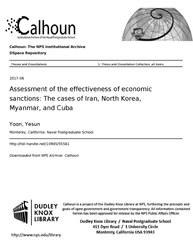File:Assessment of the effectiveness of economic sanctions- The cases of Iran, North Korea, Myanmar, and Cuba (IA assessmentofeffe1094555561).pdf

Original file (1,275 × 1,650 pixels, file size: 1.19 MB, MIME type: application/pdf, 84 pages)
Captions
Captions
Summary[edit]
| Assessment of the effectiveness of economic sanctions: The cases of Iran, North Korea, Myanmar, and Cuba
( |
||
|---|---|---|
| Author |
Yoon, Yesun |
|
| Title |
Assessment of the effectiveness of economic sanctions: The cases of Iran, North Korea, Myanmar, and Cuba |
|
| Publisher |
Monterey, California: Naval Postgraduate School |
|
| Description |
This study investigates what factors influence the effectiveness of economic sanctions in changing behavior of targeted states. U.S. and UN leaders often turn to economic sanctions rather than military force to achieve international political objectives, believing that sanctions are as effective as, and more humane than, military force. Yet, history has shown the sanctions are often ineffective in altering target states' agendas. This thesis explores the use of sanctions levied against Iran and North Korea, and examines their efficacy in preventing further nuclear proliferation by these two states. These case studies suggest the structure and type of sanctions have limited success driving behavior changes in target states. Other factors--such as the target states' motivation in pursuing a particular policy and features of their political systems, the sanctioning states' ability to punish targeted states' non-compliance, and the role of third-party spoilers, also known as black knights--play a large part in determining the value and outcome of economic sanctions. These findings are supported with a brief examination of attempts to promote democratic reforms in Myanmar and Cuba. The thesis concludes with policy implications. Subjects: economic sanctions; U.S. foreign policy; statecraft; nuclear proliferation; democracy; Iran; North Korea; Myanmar; Cuba |
|
| Language | English | |
| Publication date | June 2017 | |
| Current location |
IA Collections: navalpostgraduateschoollibrary; fedlink |
|
| Accession number |
assessmentofeffe1094555561 |
|
| Source | ||
| Permission (Reusing this file) |
This publication is a work of the U.S. Government as defined in Title 17, United States Code, Section 101. Copyright protection is not available for this work in the United States. | |
Licensing[edit]
| Public domainPublic domainfalsefalse |
This work is in the public domain in the United States because it is a work prepared by an officer or employee of the United States Government as part of that person’s official duties under the terms of Title 17, Chapter 1, Section 105 of the US Code.
Note: This only applies to original works of the Federal Government and not to the work of any individual U.S. state, territory, commonwealth, county, municipality, or any other subdivision. This template also does not apply to postage stamp designs published by the United States Postal Service since 1978. (See § 313.6(C)(1) of Compendium of U.S. Copyright Office Practices). It also does not apply to certain US coins; see The US Mint Terms of Use.
|
 | |
| This file has been identified as being free of known restrictions under copyright law, including all related and neighboring rights. | ||
https://creativecommons.org/publicdomain/mark/1.0/PDMCreative Commons Public Domain Mark 1.0falsefalse
File history
Click on a date/time to view the file as it appeared at that time.
| Date/Time | Thumbnail | Dimensions | User | Comment | |
|---|---|---|---|---|---|
| current | 20:01, 14 July 2020 |  | 1,275 × 1,650, 84 pages (1.19 MB) | Fæ (talk | contribs) | FEDLINK - United States Federal Collection assessmentofeffe1094555561 (User talk:Fæ/IA books#Fork8) (batch 1993-2020 #8423) |
You cannot overwrite this file.
File usage on Commons
The following page uses this file:
Metadata
This file contains additional information such as Exif metadata which may have been added by the digital camera, scanner, or software program used to create or digitize it. If the file has been modified from its original state, some details such as the timestamp may not fully reflect those of the original file. The timestamp is only as accurate as the clock in the camera, and it may be completely wrong.
| Short title | Assessment of the effectiveness of economic sanctions: The cases of Iran, North Korea, Myanmar, and Cuba |
|---|---|
| Author | Yoon, Yesun |
| Software used | Yoon, Yesun |
| Conversion program | Microsoft® Word 2016 |
| Encrypted | no |
| Page size | 612 x 792 pts (letter) |
| Version of PDF format | 1.4 |

